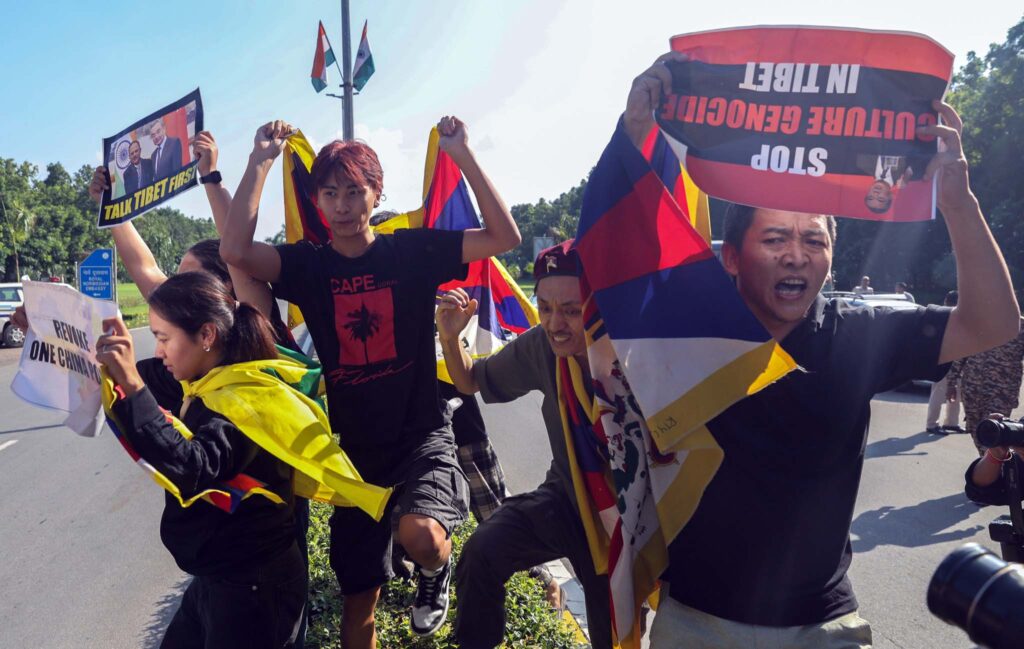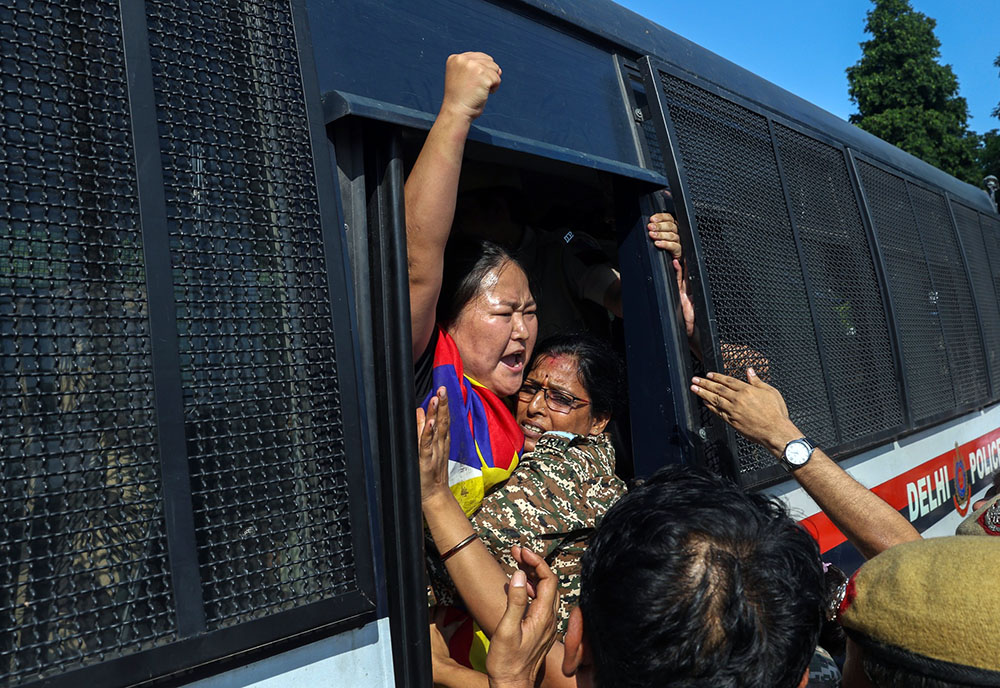(TibetanReview.net, Aug19’25) – Seven protesters from the Tibetan Youth Congress (TYC) have been detained by police in India’s capital New Delhi on Aug 18 evening as they protested in front of the Chinese embassy to highlight their demands on the arrival of China’s Foreign Minister Wang Yi for a high-profile official visit. The group was demanding an end to China’s policies that were designed to destroy the Tibetan identity and also strongly protesting against China’s interference in the recognition of the reincarnation of the Dalai Lama. Wang met with his two Indian counterparts as well as Prime Minister Narendra Modi during his two-day visit.
“The situation in Tibet has become dire due to the cruelty of the policies of the Chinese government designed to destroy the ethnic identity of Tibet and we wish to especially highlight this during Chinese Foreign Minister Wang’s visit to India,” Gonpo Dhondup, the President of TYC has told the Tibetan language tibettime.net Aug 18. The group is calling for an immediate end to these policies.
“And one of the most important and urgent issues on which we wish to express outright criticism and protest is China’s interference in the recognition of the reincarnation of His Holiness the Dalai Lama. The government of China does not have an iota of say in any aspect of the process for the discovery and recognition of the reincarnation of His Holiness the Dalai Lama and we wish to make this absolutely clear,” He has said.
The TYC president has said that his group had a duty on behalf of Tibet and all Tibetans to carry out political campaigns whenever top Chinese leaders visit any free country and will do so during Wang’s two-day stay.

He wanted India to include the issue of Tibet in its discussion of the border situation with the visiting Chinese leader, while expressing scepticism that peace can ever prevail on the India-Tibet border that runs some 3000 km from from Ladakh in western Himalayas to Arunachal Pradesh in eastern Himalayas so long as China remained in illegal occupation of Tibet.
Another group protesting during Wang’s visit was the Students for a Free Tibet (SFT) India. The group unfurled a large banner reading “Wang Yi: Free Tibet” from the Dhaula Kuan footbridge as Wang Yi’s motorcade passed under it.
Like the TYC, SFT also wanted India to raise the issue of China’s occupation of Tibet, saying this is the root-cause of the border tensions with China. It also strongly opposed China’s meddling in the recognition of the reincarnation of the Dalai Lama.
* * *
Wang’s first meeting was with his Indian counterpart S Jaishankar, which took place on his arrival. At the meeting, Foreign Minister Jaishankar made the point that the two countries would move forward with their bilateral relationship after “having seen a difficult period in our relationship” but that three key concerns needed to be addressed.
In his opening remarks, Jaishankar underscored the need to maintain peace in the border areas, ensure a “multipolar Asia” and an “exchange” of views on terrorism – a crucial point given China’s closeness to Pakistan, noted the ndtv.com Aug 18.
The Chinese foreign minister’s main agenda was to discuss the border issue with India’s Special Representative for this purpose, Mr Ajit Doval, who is also New Delhi’s National Security Adviser. This meeting, which took place today, was the 24th Round of Talks Between the Special Representatives of China and India on the Boundary Question.
Wang and Doval held an extensive meeting on settling specific issues along the border to advance the Indo-China relationship further, reported the firstpost.com Aug 19.
“I am ready to work with you to build more consensus and identify the direction, the specific goals of the next round of boundary consultations going forward and create more conditions for the improvement and further growth of our bilateral relations,” Doval was quoted as saying.
Doval has spoken of a “new energy” in diplomatic ties between the two countries while Wang has said, “History and reality proves once again that a healthy and stable China–India relationship serves the fundamental and long term interests of both of our countries,” according to the AFP Aug 19.
* * *
Wang’s visit also came ahead of the visit to China of Indian Prime Minister Narendra Modi to attend the Shanghai Cooperation Organisation (SCO) Summit, which opens in Tianjin on Aug 31. Wang met Modi later today.

“The Chinese side attaches great importance to the Prime Minister’s visit to China to attend the SCO summit at our invitation. We believe that the Indian side will also make contribution to a successful summit in Tianjin. History and reality prove once again that a healthy and stable China-India relationship serves the fundamental and long-term interests of both of our countries. It is also what the developing countries all want to see,” the firstpost.com reportquoted Wang as saying.
This will be Modi’s first visit to China since 2018.


